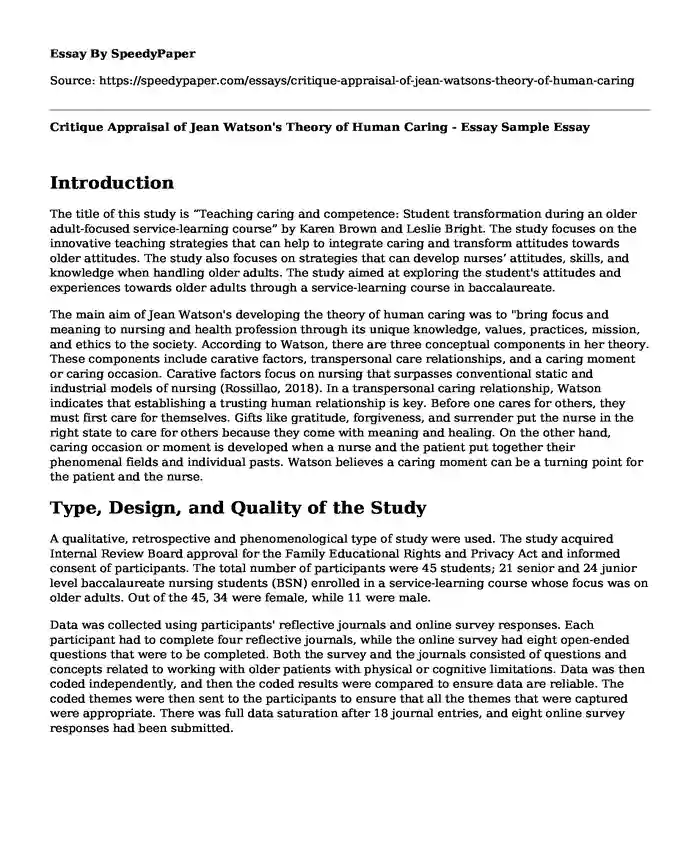
| Type of paper: | Essay |
| Categories: | Healthcare |
| Pages: | 3 |
| Wordcount: | 824 words |
Introduction
The title of this study is “Teaching caring and competence: Student transformation during an older adult-focused service-learning course” by Karen Brown and Leslie Bright. The study focuses on the innovative teaching strategies that can help to integrate caring and transform attitudes towards older attitudes. The study also focuses on strategies that can develop nurses’ attitudes, skills, and knowledge when handling older adults. The study aimed at exploring the student's attitudes and experiences towards older adults through a service-learning course in baccalaureate.
The main aim of Jean Watson's developing the theory of human caring was to "bring focus and meaning to nursing and health profession through its unique knowledge, values, practices, mission, and ethics to the society. According to Watson, there are three conceptual components in her theory. These components include carative factors, transpersonal care relationships, and a caring moment or caring occasion. Carative factors focus on nursing that surpasses conventional static and industrial models of nursing (Rossillao, 2018). In a transpersonal caring relationship, Watson indicates that establishing a trusting human relationship is key. Before one cares for others, they must first care for themselves. Gifts like gratitude, forgiveness, and surrender put the nurse in the right state to care for others because they come with meaning and healing. On the other hand, caring occasion or moment is developed when a nurse and the patient put together their phenomenal fields and individual pasts. Watson believes a caring moment can be a turning point for the patient and the nurse.
Type, Design, and Quality of the Study
A qualitative, retrospective and phenomenological type of study were used. The study acquired Internal Review Board approval for the Family Educational Rights and Privacy Act and informed consent of participants. The total number of participants were 45 students; 21 senior and 24 junior level baccalaureate nursing students (BSN) enrolled in a service-learning course whose focus was on older adults. Out of the 45, 34 were female, while 11 were male.
Data was collected using participants' reflective journals and online survey responses. Each participant had to complete four reflective journals, while the online survey had eight open-ended questions that were to be completed. Both the survey and the journals consisted of questions and concepts related to working with older patients with physical or cognitive limitations. Data was then coded independently, and then the coded results were compared to ensure data are reliable. The coded themes were then sent to the participants to ensure that all the themes that were captured were appropriate. There was full data saturation after 18 journal entries, and eight online survey responses had been submitted.
Results of the Study
From the study, the themes of apprehension, ageist stereotypes, anxiety, and anticipation emerged. At the beginning of the SL course, most participants showed negative emotions, while at the end of the course, almost every participant showed a positive response to the experience. Initially, only nine students were willing to work with the adults, and out of the nine, seven still had mixed emotions. The participants who showed anticipation had positive, personal, and past experiences with older people. However, most of the students were apprehensive, concerned, scared, timid, worried, anxious, or nervous. Some felt like they may not get attached to the older patient or their services may not be valued.
By the end of the SL course, the only negative emotions expressed were regret, sadness, guilt,lt about leaving old adults, and frustrations. Almost all students had positive feelings like satisfaction, pleasantly surprised, happiness, caring, empathy, respect, compassion, and valuing older adults. Other participants also expressed no change in their progressive, positive attitude. Many of the participants conveyed that the SL course completely changed their perspective. The older adults noted the change in stereotypes.
Conclusion
The study was able to develop a framework of caring behavior using student nurses' experience with diverse patients. The study also aimed to identify if student's knowledge, actions, attitude, and skills can impact the caring behavior. The study was able to gain a better understanding of dispelled stereotypes, patient advocacy desire, showing dignity and respect for others, dissimilar populations, and increased awareness of valuing others. The students also showed their therapeutic and interpersonal relationships with patients as being inspirational, insightful, and beneficial. In conclusion, this teaching strategy transformed attitudes of participants towards older adults, increased the desire to work with older adults, reduced fear of older populations, and increased the formation of a transpersonal caring relationship using nursing skills and knowledge. However, the study had limitations, including not all participants responded, and the participants' initial attitudes were collected retrospectively.
Reference
Durgun Ozan, Y., & Okumus, H. (2017). Effects of nursing care based on Watson's theory of human caring on anxiety, distress, and coping when infertility treatment fails: A randomized controlled trial. Journal of Caring Sciences, 6(2), 95-109.
Rossillao, K. (2018). Caritas education: Theory to practice...2018 National Teaching Institute research abstracts presented at the AACN National Teaching Institute, Boston, Massachusetts, May 21-24, 2018. American Journal of Critical Care, 27(3), e 14 - e15.
Cite this page
Critique Appraisal of Jean Watson's Theory of Human Caring - Essay Sample. (2023, Dec 28). Retrieved from https://speedypaper.com/essays/critique-appraisal-of-jean-watsons-theory-of-human-caring
Request Removal
If you are the original author of this essay and no longer wish to have it published on the SpeedyPaper website, please click below to request its removal:
- Essay Sample on Health Care Funding in United States of America
- Free Essay. The Impact of Food on Human Culture and Societies
- Free Essay Example: Anorexia Nervosa
- Essay Example: Use of the Balanced Scorecard in Health Care
- Free Essay: The Effect of Alcohol or Drug Dependency on Family
- Essay Sample on Text Messaging Appointment Reminders To Patients
- COVID-19 Response: Reflecting on Project Development Challenges in Education
Popular categories




